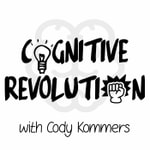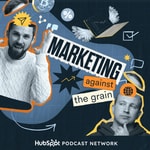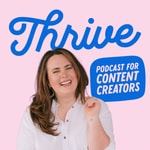Meaning Lab – Détails, épisodes et analyse
Détails du podcast
Informations techniques et générales issues du flux RSS du podcast.

Meaning Lab
Cody Kommers
Fréquence : 1 épisode/14j. Total Éps: 121

codykommers.substack.com
Classements récents
Dernières positions dans les classements Apple Podcasts et Spotify.
Apple Podcasts
🇨🇦 Canada - socialSciences
22/05/2025#98🇨🇦 Canada - socialSciences
21/05/2025#83🇨🇦 Canada - socialSciences
20/05/2025#66🇨🇦 Canada - socialSciences
19/05/2025#50🇨🇦 Canada - socialSciences
18/05/2025#34🇨🇦 Canada - socialSciences
16/05/2025#89🇨🇦 Canada - socialSciences
15/05/2025#70🇨🇦 Canada - socialSciences
14/05/2025#54🇨🇦 Canada - socialSciences
13/05/2025#38🇨🇦 Canada - socialSciences
02/05/2025#96
Spotify
Aucun classement récent disponible
Liens partagés entre épisodes et podcasts
Liens présents dans les descriptions d'épisodes et autres podcasts les utilisant également.
See all- https://chat.openai.com/chat
178 partages
- https://www.exponentialview.co/
117 partages
- https://twitter.com/codykommers
34 partages
- https://twitter.com/anilkseth
10 partages
- https://twitter.com/olgakhazan
5 partages
Qualité et score du flux RSS
Évaluation technique de la qualité et de la structure du flux RSS.
See allScore global : 64%
Historique des publications
Répartition mensuelle des publications d'épisodes au fil des années.
#108: Humanism and the conversation of the ages (feat. Sarah Bakewell)
mardi 14 novembre 2023 • Durée 29:44
Ludwik Zamenhof was born in 1859 in a small city in Poland. His family was Jewish, and the area he grew up in also had factions of Germans, Russians, and Poles, all of whom mutually distrusted one another. During his childhood, Zamenhof developed a theory: these groups would never get along without a common, neutral language to communicate with people in the other groups. Zamenhof considered the possibility of using existing languages for this purpose—such as Latin and Greek—but decided that the cost to learn them was too high. So he invented his own.
Esperanto, as Zamenhof’s language came to be known, sought to take familiar Indo-European root words and cast them in a language without verb conjugations, cases, gender, or any of the elements which make a language like German or Russian so difficult to learn. He was nineteen when he first unveiled the language to the public. Zamenhof’s goal was not just to create a language that was easy to learn, but to create a language that would put the different peoples of Europe on a footing of mutual disadvantage—and therefore, he hoped, equality.
As far as invented languages go, Esperanto has enjoyed more success than most. You can study it on Duolingo. It’s a staple of popular culture; for example, I recently saw in an episode of the TV show Billions, where it is being learned by the character Michael Wagner. But mostly, this success has been on the linguistic front. People find the language interesting. But it hasn’t been especially useful as a basis for utopia.
In a way, Zamenhof’s Esperanto is a microcosm of the system of values more generally known as “humanism.” There are many shades of humanism, but at their core lies a belief that understanding, connection, and even mutual admiration among different kinds of people is not only possible but paramount to a meaningful life. If we could all converse with one another, understand one another—then maybe we’d stand a chance of constructing the kind of society we all want to live in.
But while Esperanto embodies the aspirations of humanism, it also is emblematic of its tensions. In theory, getting people to celebrate the many ways of being human is an ideal worth striving for. In practice, it is a difficult one to achieve. When it comes to the ways of being humans, what all humans have in common is that they prefer their own.
The fundamental impulse of humanism is to grapple with this tension, and it is the subject of the latest book by author Sarah Bakewell. In it, she surveys 700 years of humanist thought—with each thinker bringing a personal perspective to the shared problem of what it means to value human life and society in an abstract sense. The experience of reading Bakewell’s book is to hear the echoing conversation of the ages. One of the ways of reading humanism is to see it as a means of participating in this conversation. It’s a notion I think is rather beautiful.
Her book is Humanly Possible: Seven Hundred Years of Humanist Freethinking, Enquiry and Hope. It’s available now.
This is a public episode. If you’d like to discuss this with other subscribers or get access to bonus episodes, visit codykommers.substack.com/subscribe
#107: How a really good travel writer approaches her experiences abroad—and at home (feat. Erika Fatland)
mardi 25 avril 2023 • Durée 01:00:53
The Person and the Situation is a book by social psychologists Lee Ross and Richard Nisbett, originally published in 1991. The argument made by Ross and Nisbett was that context matters. Human beings don’t behave in a vacuum, unaffected by the circumstances of society, history, and culture. The job of the social psychologist is to understand both the person and the situation. Without a proper appreciation of the larger context, it’s impossible to know what to make of any given observation about human behavior.
But a limitation of the project set out by Ross and Nisbett is that social psychology has always had a limited ability to study “situations.” It is, after all, psychology—not anthropology. Psychologists tend not to study humans in their natural situations; they try to recreate paired down versions of them in the lab. It’s not the same thing.
This is something Ross and Nisbett, I think, appreciated. Nisbett went on to publish a book called The Geography of Thought, about how people from the West think differently from people in Asia. But another way to approach this problem is not from the psychology side, at least not directly—to start not with the person, but the situation itself. This is what I like about really good travel writing.
The job of a travel writer is similar to the job of the anthropologist. It is to go to a place and get a feel for what people are up to there. Then to come back and report to the rest of us what it is you observed. But the problem with ethnographies by anthropologists is that they’re usually not that fun to read, obsessed as they are with kinship structures and long-standing epistemological debates within their field. Good travel writing has the same incisive edge as an informal ethnography—and has the benefit of being much more engaging. Good travel writing is an exploration of the person via the situation.
For my money, the best author doing this kind of travel writing today is Erika Fatland. Erika is the author of three travel books, including Sovietistan, about the post-Soviet states of central Asia; The Border, about the countries bordering Russia from North Korea and Mongolia to Finland and Norway; and High, about the countries of the Himalayas. She speaks six languages, including Russian, and is currently adding more. She also trained as a social anthropologist for her master’s degree, which probably goes a ways toward explaining where that incisive edge came from.
Erika’s approach to travel writing incorporates her own travel experiences with deep readings of a country’s historical, cultural, and economic circumstances. More than other travel writers I’ve read, she relies on her conversations with people she meets in the places she goes—usually finding at least one common tongue between them—and uses these interview as a foundation for her own observations. In this conversation, we talk about the point of travel, Erika’s formative experiences and how she became a travel writer, her approach to writing, how her relationship with Russia has changed through the years, and some of her favorite (and least favorite) countries she’s visited.
This is a public episode. If you’d like to discuss this with other subscribers or get access to bonus episodes, visit codykommers.substack.com/subscribe
A Small Exercise in Gratitude
vendredi 30 décembre 2022 • Durée 05:53
And a minor resolution about friendship.
This is a public episode. If you’d like to discuss this with other subscribers or get access to bonus episodes, visit codykommers.substack.com/subscribe
Lab Lockdown #1: Jaclyn A. Siegel
jeudi 19 mars 2020 • Durée 51:53
Subscribe at codykommers.substack.com
This is a public episode. If you’d like to discuss this with other subscribers or get access to bonus episodes, visit codykommers.substack.com/subscribe
#19: Christof Koch on Incandescent Intellectualism
mardi 17 mars 2020 • Durée 01:10:43
Subscribe at codykommers.substack.com
This is a public episode. If you’d like to discuss this with other subscribers or get access to bonus episodes, visit codykommers.substack.com/subscribe
#18: Michael Tomasello on Writing for Young People
mardi 10 mars 2020 • Durée 52:02
If you enjoy the show, please consider subscribing! You can follow me on Twitter @codykommers, and through my newsletter at codykommers.com/newsletter.
Subscribe at codykommers.substack.com
This is a public episode. If you’d like to discuss this with other subscribers or get access to bonus episodes, visit codykommers.substack.com/subscribe
#17: Sander van der Linden on Intrinsic Motivation
mardi 3 mars 2020 • Durée 01:24:07
Subscribe at codykommers.substack.com
This is a public episode. If you’d like to discuss this with other subscribers or get access to bonus episodes, visit codykommers.substack.com/subscribe
#16: Heather Berlin on Bringing Science to the Masses
mardi 25 février 2020 • Durée 58:23
Subscribe at codykommers.substack.com
This is a public episode. If you’d like to discuss this with other subscribers or get access to bonus episodes, visit codykommers.substack.com/subscribe
#15: Nicola Clayton on Enthusiastic Serendipity
mardi 18 février 2020 • Durée 01:09:12
Subscribe at codykommers.substack.com
This is a public episode. If you’d like to discuss this with other subscribers or get access to bonus episodes, visit codykommers.substack.com/subscribe
#14: Weiji Ma on Dealing with Imposter Syndrome
mardi 4 février 2020 • Durée 01:03:45
Subscribe at codykommers.substack.com
This is a public episode. If you’d like to discuss this with other subscribers or get access to bonus episodes, visit codykommers.substack.com/subscribe









